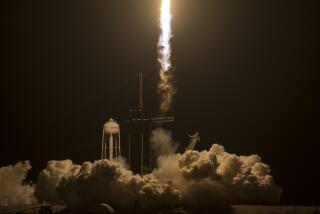Launch Failure Is Blow to Chinese, TV Across Asia
HONG KONG â When a Chinese rocket carrying a U.S.-made satellite exploded in flames and fell to Earth early Thursday, so did the lofty hopes of Chinaâs aerospace industry and many international TV broadcasters.
The Apstar-2 satellite, made by Los Angeles-based Hughes Space & Communications Co., was to be the main platform for a raft of major American programmers, including CNN International, the Disney Channel, Time Warner, HBO Asia, ESPN International, MTV Asia and the Discovery Channel.
All were counting on the high-tech satellite to reach viewers across Asia. It boasted a signal âfootprintâ that would have reached from India to Australia, beaming down programming to two-thirds of the worldâs population.
âThis is a very risky business,â said Don OâNeal, a Hughes spokesman, noting that only three of five launches from China have succeeded. âChina doesnât have an extensive track record you can rely on.â
Hughes, the satellite-building subsidiary of Hughes Aircraft Co., built the first satellite China put in space. The company said it has reserved options for several launches in the next few years, but has committed to none.
âWeâre waiting for the . . . resultsâ of an investigation into Thursdayâs launch failure, OâNeal said.
Satellites are vital to one of the hottest businesses in Asiaâs emerging consumer markets: television.
Some of biggest names in U.S. television programming had grand hopes for expanding their audiences through Apstar-2, owned by Hong Kong-based APT Satellite Co. and the Chinese government. It was seven times more powerful than others now in space, enabling viewers to pull in its signal with a relatively small receiving dish.
*
âObviously weâre disappointed,â said Vanessa Tatham, ESPNâs Hong Kong spokeswoman. âBut it wonât affect our existing service, so weâre OK.â
ESPN, like most other international programmers, leases transponders on other satellites covering the region, but it now takes five overlapping footprints to equal the coverage Apstar-2 would have provided.
Others, like Dow Jones & Co.âs Asian Business News and NBCâs rival business channel, will be scrambling to make up for dashed coverage plans, especially in Indiaâs huge potential market of 800 million people. Asian Business News is now on the Palapa-B satellite, which has a limited footprint over Southeast Asia. NBCâs Asia channel was to beam from the now-defunct Apstar-2.
It wonât be easy for programmers to replace Apstar-2. The next satellite to go up this year, Asiasat 2, already has a waiting list. And even that launch may be postponed if investigators find a design flaw in the Chinese Long March rocket, the type that exploded Thursday. The rockets are made from converted ballistic missiles.
Alone among programmers, the regionâs satellite-television pioneer STAR TV may benefit from Apstar-2âs loss, at least in the short term. STAR, owned by Rupert Murdochâs News Corp., is already entrenched in the skies and has now briefly escaped the competition it inspired.
âSTAR has a huge advantage at the moment,â said MTV Chairman Tom Freston in an interview before the explosion. âSTAR is going to have a ton of competition, not just from MTV, and one might say they are enjoying now what are their best days.â
The lure of reaching billions of viewers with a single satellite has broadcasters crowding into Asiaâs skies. There are already a dozen satellites beaming TV to the region, with forecasts of at least 50 more to come in the next decade. Limited slots are supposed to be apportioned by the International Telecommunication Union to prevent traffic jams in the sky.
For Chinaâs aerospace program, the explosion was a major humiliation.
State television aired the Long March 2E rocket liftoff live from the Xichang Satellite Launching Center in the southwest province of Sichuan. But just over a minute after launch, the rocket and satellite exploded in a red fireball.
âA rocketâs transition from Stage 1 to Stage 2 is usually quite smooth. But I saw the flame spread, then a bright explosion. Burning pieces from the rocket fell to the ground and the mountain was on fire,â said I. K. Im, a satellite communications manager for Reuters Television, who was watching a live broadcast in Hong Kong.
*
Afterward, a commentator appeared and said, âAs everyone has just seen from the screen, our launch of the Apstar-2 satellite . . . was not successful because of an accident,â according to the Associated Press.
âWe believe that Chinaâs space experts and technicians . . . will investigate the problem, learn from the experience and strive for continued successes,â he said.
Shanghai-based Pacific Insurance Corp. had insured Apstar-2 for $160 million and says it will pay the claim within 60 days.
China successfully launched a sister satellite, Apstar-1, last July, but recently has had more âlearning experiencesâ than successes in its fledgling launch industry. Just two months ago, it lost its East-Is-Red 3 telecommunications satellite soon after launch because of a fuel leak. In December, 1992, a Long March rocket carrying an Australian Optus satellite exploded during launch.
More to Read
The biggest entertainment stories
Get our big stories about Hollywood, film, television, music, arts, culture and more right in your inbox as soon as they publish.
You may occasionally receive promotional content from the Los Angeles Times.










